#hamas was still firing rockets at Israel the whole time during the “ceasefire”
Text
We Don’t Recognise Our Own City: The Bastard Child of the United States Zionist Cunt Israeli Barrage Redraws the Map of Gaza
A ceasefire is finally in force, but traumatised families have little hope as they recall collapsing buildings and deaths of loved ones
— Oliver Holmes and Hazem Balousha in Gaza City | Saturday, 22 May 2021
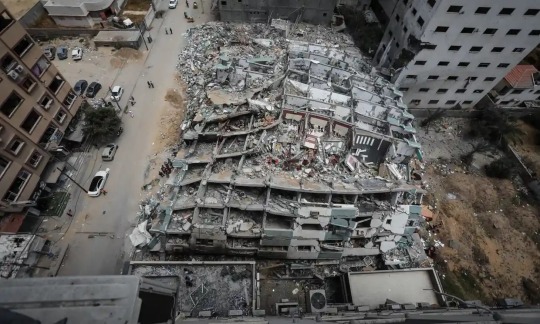
As they emerge from hiding, people living in Gaza City have had to adapt their memories. So deformed is this small place on the coast that a mental map of its roads and landmarks from two weeks ago is largely useless today. Shortcuts to avoid traffic may no longer work, as craters dot back streets and rubble blocks roads. Locally famous high-rises no longer exist.
Eleven days of bombardment have buckled the city. Air attacks shook the ground so violently that some bomb sites appear as if buildings have been pulled into the earth rather than hit from above.
On one street, the bent walls of a kindergarten descend downwards at an angle until they disappear completely.
Israel’s latest war with Hamas, which ended in a ceasefire on Friday, killed 248 Palestinians, including 66 children as well as scores of fighters, and left more than 1,900 wounded in Gaza.
In Israel, 12 people, including one soldier and two children, were killed by militants firing rockets, mortars and anti-tank missiles. The country’s prime minister, Benjamin Netanyahu, said his forces had done “everything possible” to keep their own citizens safe, but also to make sure Palestinian civilians were not in harm’s way.
Statements like those would lead to scoffs along al-Wehda Street, a main road in the centre of Gaza City. The boulevard has been rocked by several strikes during the past week, including the deadliest single attack of the latest round, which killed 42 people.
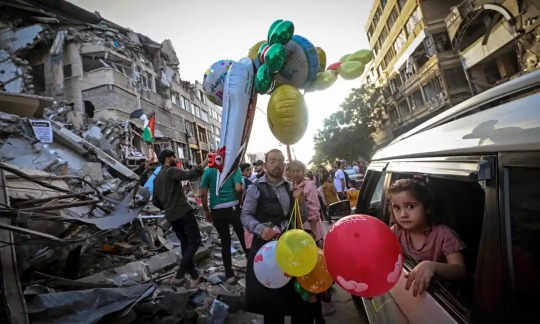
A Palestinian man sells balloons in front of the destroyed al-Shuruq building. Photograph: Mahmud Hams/AFP/Getty Images
At one end of al-Wehda, Gaza’s largest medical facility, Shifa hospital, contains many who survived.
Amjed Murtaja, 40, lay in a hospital bed, his legs dotted with scratches. He was in his fourth-floor rented apartment on al-Wehda when he said a missile hit his balcony. “The building was shaking. My only thought was to get to my wife and son,” he said. Murtaja ran to the other room just in time to embrace his family before a second strike hit, causing the entire structure to collapse. “We fell together,” he said. When they landed, Murtaja had his arms pinned, although his wife, Suzan, and his two-year-old boy were next to him.
As he spoke of being trapped, other patients, visitors and a hospital cleaner stopped what they were doing and listened intently. Murtaja and his wife, who doctors would later confirm had broken her back, would be trapped for four hours until neighbours and rescuers dug down and dragged them out.
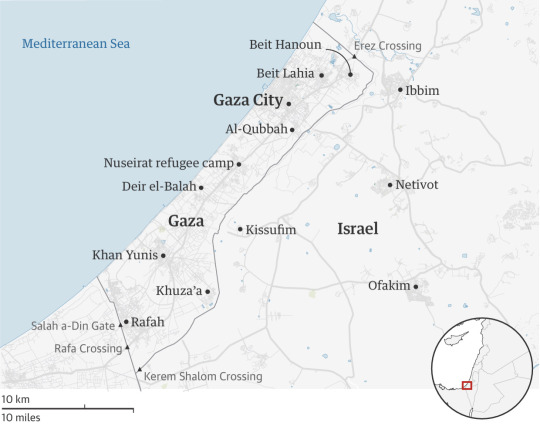
In the same strike, several members of the al-Auf family, including one of Gaza’s most prominent doctors who worked as the head of Shifa’s coronavirus response, would be pulled out dead. Murtaja said that while he was trapped, he could hear neighbours from inside other parts of the debris. “They were screaming,” he said.
His wife was now in the same hospital, but two floors down in a women’s ward. A drip fed liquid into her hand, and a plastic water bottle and yoghurt pot sat on a shelf by her bed. Under heavy pain killers, her eyes rolled as she spoke. Suzan Murtaja, 36, said that when the building fell in on itself, she was so disorientated that she first thought only a cupboard had fallen on them. But, with one free arm, she was able to reach her phone. “I turned on the phone light and we realised the building had collapsed.”
For those four hours, even before she knew they would be found and would live, she tried to calm her son to sleep, but bits of rubble and dust kept falling and waking him up.
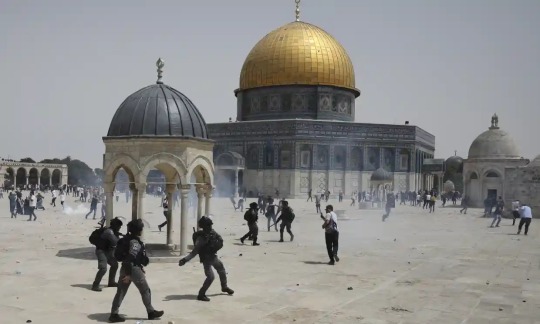
Palestinians run from sound grenades thrown by Israeli police in front of the Dome of the Rock in the al-Aqsa mosque complex in Jerusalem, on 21 May. Photograph: Mahmoud Illean/AP
Israel said the aim of its attack on al-Wehda last Sunday was to destroy an extensive network of tunnels it called the “Metro”. The military said it had not intended to make the building collapse.
What Hamas was hiding in those underground passageways, if they existed, is unclear. Al-Wehda is deep within the city and far from the frontier with Israel.
Nearly a week after the attack, large mounds of concrete still lined the road. A seven-storey building that survived stood at an ominous angle, as men quickly removed wooden furniture from the ground floor. Further up al-Wehda stood a giant pile of debris that once housed the Murtajas’ apartment. Amid the dust were twisted plastic water tanks, a washing liquid bottle, pillows and a frying pan. All that remained was a three-storey-high internal staircase at the back. A sign has been erected with the names of the dead and “Al-Wehda massacre” written on it in Arabic.
A yellow taxi pulled up, and a woman got out with her teenage son. She said her name was Zakia Abu Dayer, 44, and she lived in the next building. It was the first time she had been back, she said, to collect some belongings.
On the night of the bombing, as the Murtajas were trapped under the rubble, Abu Dayer, her husband and her son moved further up the street to a relative’s home. They thought they would be more secure there as it was on the ground floor, possibly allowing them to rush outside quickly.
But two days later, she and other family members were eating rice and lentils outside when another strike hit. “There is no safe space,” she said, her leg still wrapped in bandages. “The whole place went black.”
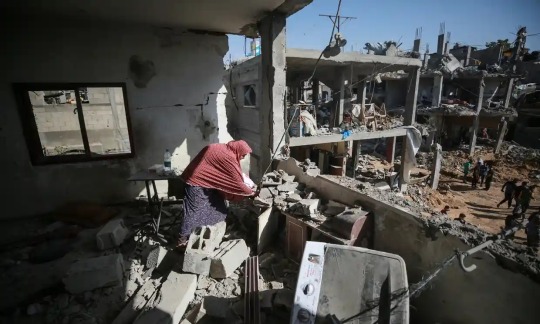
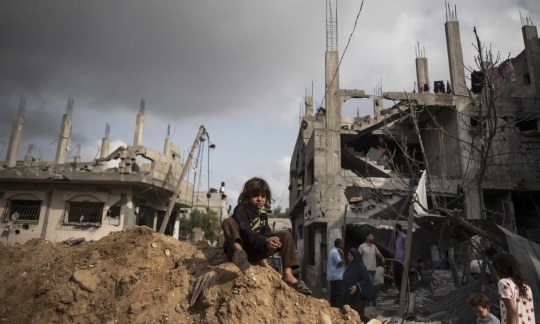
People in Beit Hanoun return to their homes after the ceasefire. Photograph: Anadolu Agency/Getty Images (Left). Palestinians inspect the damage of their destroyed homes in Beit Hanoun following a ceasefire after an 11-day war between Gaza’s Hamas rulers and Israel. Photograph: Khalil Hamra/AP (Right).
Abu Dayer remembers smoke and then rushing water as the tanks on the building above exploded in the blast. Her husband, who was a few metres away from her, was killed after shrapnel hit his head. An 11-year-old relative was also killed.
The building that was hit still stands, although its windows were blown out. The ground floor was a bank with two ATMs covered in dust. A dental clinic sits on the first floor. Several local charities operated there. Higher up, a box with “US AID” written on it is visible through the smashed glass.
Across the road stands the damaged shell of another building. “It’s a very old primary health clinic, maybe the oldest in Gaza,” said Abdel-Latif al-Hajj, director-general of international cooperation at the ministry of health in Gaza, who stood by the gate.
At first glance, the clinic appears to have been bombed, with large pockmarks across its walls and football-sized bits of debris covering the ground. However, it was not hit directly. Instead, when the Israeli missile struck the building across the road, it ripped off the top two floors, which then slammed into the clinic.
‘It will not be the last war’: Palestinians and Israelis reflect on Gaza ceasefire
Al-Hajj said the building was Gaza’s main testing centre for Covid. Staff had been working inside during the explosion, and several were wounded. Gaza was already suffering a dangerous spread in infections, and another outbreak is expected, he said.
“Anyone can imagine what will happen if we stop doing tests,” said al-Hajj. In addition, the war had meant thousands of displaced people were now crowded together, which could speed up transmission.
According to the United Nations, the violence on Gaza has destroyed nearly 260 buildings. Fifty-three schools, six hospitals and 11 primary healthcare centres have been damaged. Nearly 80,000 people were internally displaced, and 10 times that number have little access to piped water. As well as Israeli strikes, armed groups have launched faulty rockets that landed short, with reports of extensive damage and even fatalities within Gaza.
The strip’s two million inhabitants already live inside what they call the “world’s largest prison”, with more than 50% unemployment, a collapsed healthcare system, sometimes-poisonous water, and relentless power cuts.
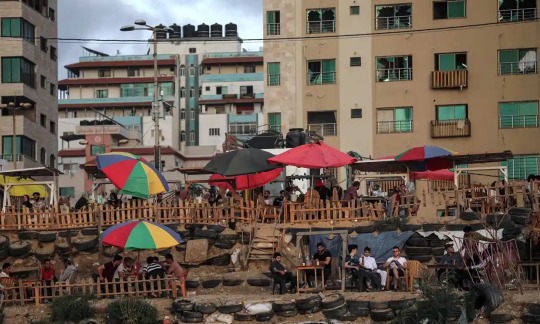
Palestinians enjoy the beach as the ceasefire came into effect on 21 May in Gaza City. Photograph: Fatima Shbair/Getty Images
Israel and Egypt, Gaza’s other neighbour, have maintained a crippling blockade, locals say “siege”, for 14 years. Israel, which recalled its forces occupying the area in 2005, says the restrictions are for its security. But the UN says the blockade constitutes collective punishment.
At the damaged clinic on al-Wehda Street on Saturday, Lynn Hastings, the UN’s deputy special coordinator for the Middle East peace process, had come to assess the impact.
Flanked by aides and bodyguards, she was asked by a television reporter if this round of violence might, unlike the previous three wars, spur significant political change.
“Everyone is saying it should not be business as usual,” she responded. “You know what the definition of insanity is,” she added rhetorically. She was referring to a quote usually attributed to Einstein, that insanity is doing the same thing over and over again and expecting a different result.
Palestinians return to devastated homes as UN calls for Gaza dialogue
Friday’s ceasefire brought some Palestinians and Israelis hope that the violence would spur a renewed push to resolve the crisis. Hamas kicked off this round of fighting when it launched rockets at Jerusalem on 10 May, but it followed weeks of growing frustrations over the treatment of Palestinians by Israel, which has for decades dictated how millions live their lives.
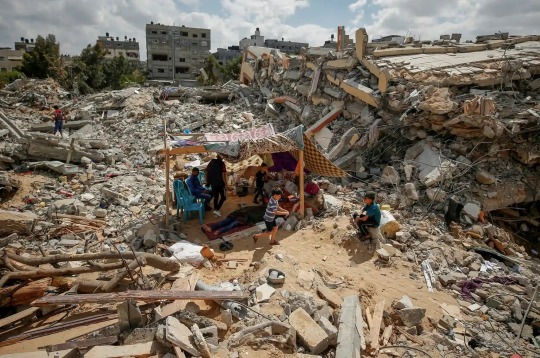
Gaza! Palestinians sit in a makeshift tent amid the rubble of their houses which were destroyed by Israeli airstrikes.
The head of Oxfam in Israel and the Palestinian territories, Shane Stevenson, said the truce should not be celebrated as a solution. Israel should be held to account “for the atrocities it has committed over the last 12 days”, as should armed factions in Gaza for their indiscriminate targeting of Israeli towns and cities.
The truce, he added, “will not change the illegal occupation and denial of human rights which Palestinians are subjected to daily. This inhumane and brutal status quo has to change, once and for all.”
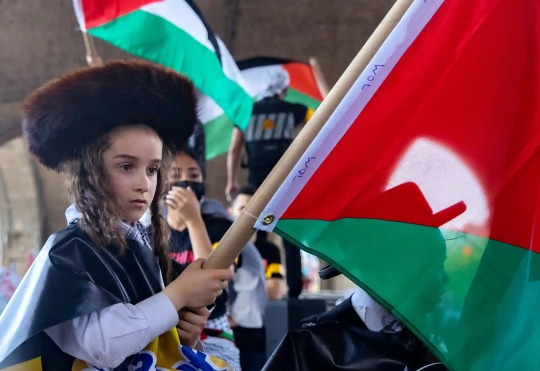
New York, US! A Jewish boy holding a Palestine flag takes part in a protest in support of Palestinians in the Queens borough.
Lying in Shifa hospital, Amjed Murtaja had less ambitious reasons to be happy. Despite his exhaustion and injures, he had stayed up late on Thursday as rumours of a ceasefire circulated. He had been waiting for the ceasefire announcement, he said, “because I don’t want to lose the rest of my family”.
— The Guardian USA
0 notes
Text
Watching Over Zion Report 29th November 2018 (21st Kislev 5779)

THE WORD
Arise, shine, for your light has come, and the glory of the Lord rises upon you. See, darkness covers the earth and thick darkness is over the peoples, but the Lord rises upon you and his glory appears over you. Nations will come to your light, and kings to the brightness of your dawn. Lift up your eyes and look about you: All assemble and come to you; your sons come from afar, and your daughters are carried on the hip. (Isaiah 60:1-4)
Command the Israeli’s to bring you clear oil of pressed olives for the light so that the Menorah may be kept burning. In the Tent of Meeting, outside the curtain that is in front of the Testimony, Aaron and his sons are to keep the lamps burning before the LORD from evening till morning. This is to be a lasting ordinance among the Israeli’s for the generations to come. (Exodus 27:20-21)
POINTERS FOR PRAYER
Please use this report for the purpose of prayer. Please intercede over the areas you feel the Spirit lay upon your heart. As Chanukah draws close, let us give thanks to God for the restoration of Israel in our day! 'Hear the word of the LORD, O nations; proclaim it in distant coastlands: "He who scattered Israel will gather them and will watch over his flock like a shepherd." For the LORD will ransom Jacob and redeem them from the hand of those stronger than they. (Jeremiah 31:10-11). As we continue look at the current circumstances within and surrounding Israel, let us remain watchful and constant in our prayers, and continue to pray that the LORD God would place His Wall of Fire around the Nation and people of Israel.
Please continue to pray for encouragement, strength and perseverance for the Israeli people in the face of constant physical and spiritual opposition.Do keep praying regarding the issue of Iran and Gaza. Hamas continue to add to the despair of many in Israel, along with many of their own people in Gaza by their actions and continued violence along the border of Gaza (see last section of this report). Pray that the truth would be reported by the Western Media.
LIGHT OF THE WORLD

The festival of Chanukah is only 4 days away (it falls early in 2018). It begins in the evening of Sunday, 2 December and ends in the evening of Monday, 10 December. As the temperature gets colder and we anticipate the icy mornings and even possible snow, the days are dark and people will try to combat the darkness with lights and candles.
It is said that people living without sunlight become weary and gloomy, even suffering with depression. Human beings need the sun, and to experience sunlight, the human being will maintain a positive healthy life. Many years ago I used to suffer from 'Sad Syndrome' (seasonal affective disorder – a type of depression through lack of sunlight). However, here in the UK our days get 'longer' [albeit very slowly] again in little under a month. That's good news! But spare a thought for those who live in Tromsø (Norway). As this report is being written, the people living in Tromsø only had 28 minutes of daylight. And, the sun set at 11:45 am, and won’t rise until 11:30am on 15th January 2019. That's 48 days without the sun!!
One good thing about this time of the year is that we can celebrate the festival of lights. Both the celebration of the Festival of Lights (Chanukah) and the celebration of the birth of the Messiah Yeshua (Jesus) are times when houses are especially filled with lights. But have you noticed that people put their Christmas decorations up early every year? To me, this speaks of the need to have light and something to look forward to. The people are crying out for something to pull them out of the darkness.
In the Scriptures, the Nation of Israel is often referred to as “a light to the Nations” - In his writings and speeches, David Ben Gurion emphasised his vision of the state of Israel as a moral and social beacon to the whole world, and by that, in his view, it would implement the vision of the prophets. David Ben Gurion said, “History did not spoil us with power, wealth, nor with broad territories or an enormous community lot, however, it did grant us the uncommon intellectual and moral virtue, and thus it [the virtue] is both a privilege and an obligation to be a "Light unto the Nations"”. Even Israel’s emblem is the Menorah which is derived from the image of the state of Israel as a "Light unto the Nations".
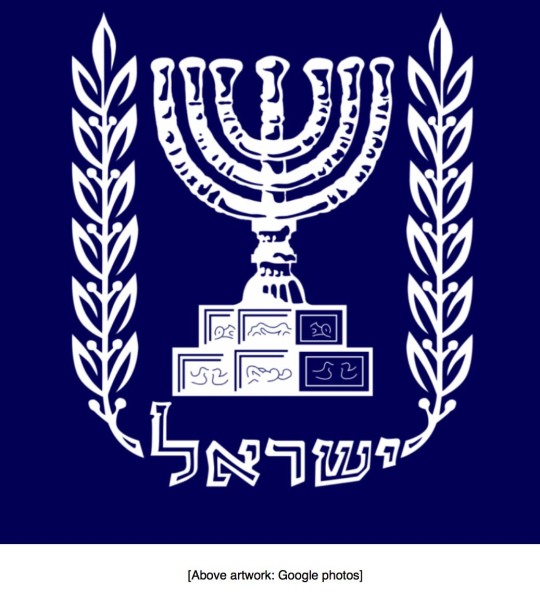
Chanukah is the celebration of the victory of the Word of God over all pagan and anti-Semitic forces – the victory of the sons of Zion against the sons of Greece! It may even have been prophesied in the Scriptures as Zechariah 9:13 reads, "I will rouse your sons, O Zion, against your sons, O Greece, and make you like a warrior's sword." Chanukah starts on the Hebrew calendar date of 25th Kislev, and lasts for eight days. Of course, one of the themes of Chanukah (the Feast of Dedication – see the gospel of John 10: 22vv) is the wonderful miracle of keeping the Menorah Candles burning – to hallow God’s holy Name.
To understand Chanukah, one needs to read Exodus 25:31-40. An order was given for keeping the Menorah (which stood in the Tabernacle and later in Solomon’s Temple in Jerusalem) to constantly burn to represent the light of God. Chanukah’s theme is of course about miracles. The holiday commemorates two major miracles which took place in the time of the Maccabees: the miraculous victory of the tiny Jewish army over the vast Syrian-Greeks, and the miracle of the small vial of oil which burned for eight days when it should have lasted only one day. It was also during Chanukah that Jesus performed many miracles and spoke of these. In John 10:37-38 Jesus states, “If I am not doing deeds that reflect my Father, don’t trust me. But if I do, though you don’t believe in me, believe the works: that you may know, and believe, that the Father is in me, and I in Him.” Yeshua (Jesus) wanted the people of His day to see His miracles and believe in Him as a result. His miracles point to His divine and messianic identity. In this way Yeshua personifies the message of Chanukah: God actively involved in the affairs of his people – surely this must give us hope?
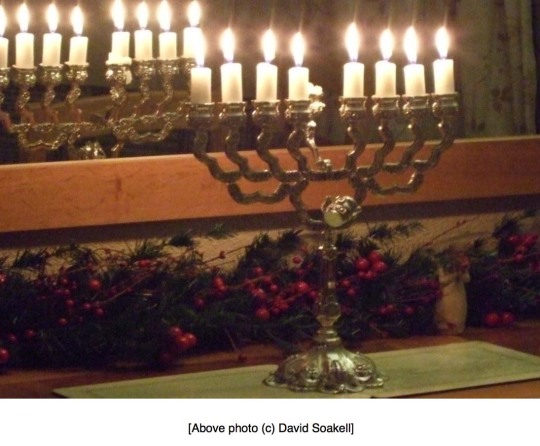
Chanukah reminds us that God is a God of miracles, not just of concept and religious ideals. He has broken through into human history and continues to do so today. Yes, world events do appear to be getting out of control; however there is One, who from the beginning of time has all things under His complete control. This is the Sovereign LORD God, who was, and is, and is to come – the one who ‘in the beginning was the Word, and the Word was with God, and the Word was God. He was with God in the beginning. All things came to be through Him, and without Him nothing made had being… The light shines in the darkness, and the darkness has not suppressed it. (John 1:1-5). Let’s pray that Israel is indeed that light shining in the Middle East and even throughout our troubled world, but that they would also see their Messiah – The Light of the world.
BATTLES IN AND AROUND ISRAEL
Throughout its turbulent ancient history, and indeed most of its modern history, Israel has seen many battles. Today, the battle of survival is as great as it’s ever been, however there is also a great battle going on within.
This week, the Knesset was to vote on Culture Minister Miri Regev's controversial "cultural loyalty law" that would strip state funding from any cultural bodies that work to slander the Jewish state or its institutions. Not all coalition members are enthusiastic about the bill, many calling it a violation of free speech. With just 61 out of 120 Knesset seats on his side, and such challenging votes ahead, Finance Minister Moshe Kahlon doesn't believe Netanyahu's government can survive for very long. "A majority of just 61 seats is a problem," Kahlon said in a radio interview. "It will be very difficult to push through laws. You can't get everyone to agree on every detail of a controversial law."
Then of course, there is the constant battle of ‘survival’. 2018 has seen many battles for Israel to face. The latest round of fighting in Gaza might be over for now (although there has still been rockets fired this week), but it forced Minister Avigdor Lieberman to resign. The Defence Minister resigned over the cabinet's decision to accept a ceasefire ending the current fighting with Hamas and other Islamic Palestinian militants in Gaza. Avigdor Lieberman denounced the move as "surrendering to terror". Benjamin Netanyahu's government survived the resignation of Lieberman and the withdrawal of his Yisrael Beiteinu party from the ruling coalition recently. But now, Netanyahu governs with the slimmest of majorities, and there are some big votes coming up in the Knesset.
Netanyahu defended the government’s decision of a ceasefire last week and stated that he was “acting on information about Israel’s enemies that he cannot share with the public.” Netanyahu went on to say that “Israel would take action to defeat them at a time and in a manner of its choosing.” That was certainly an interesting statement – so what exactly did he mean? Could he have been talking about Iran? After all, the role Iran is playing in Gaza is a very dangerous game. Take for example the Hamas missile strike against a bus recently. The anti-tank missile that hit the bus is chilling. Had it hit the bus full of people, no one inside could have survived. But minutes before the missile struck, the bus was indeed full, with 30 young IDF soldiers. One soldier stated, “We began to sing the Chanukah song that speaks of the miracles that took place as God protected Israel.” Moments after all 50 had exited the bus, a Hamas anti-tank missile hit it, turning it instantly into a ball of fire. Speaking of miracles, the Arab bus driver who had been driving the IDF soldiers stated “God loves Israel. I just let off 50 soldiers from the bus. A minute later the bus was hit. 60 seconds earlier and you would have had 50 dead soldiers.”
However what is troubling is that Hamas terrorists in Gaza filmed the blast. But according to Israel’s Hadashot news network’s Arab affairs commentator, Ehud Ya’ari, the footage of the blast was first broadcast on Iranian television in Lebanon and only later rebroadcast on Palestinian television. Could this be significant? Well, we know that Hamas and Islamic Jihad are not independent actors in their aggression against Israel. Rather, they are Iranian proxies. They receive their orders from Iran’s Revolutionary Guard Corps and Iran’s Lebanese army, Hezbollah. And they report to their Iranian and Lebanese commanders. So when Hamas and Islamic Jihad go to war against Israel from Gaza, the reason is because Iran told them to do so. So when Israel decides not to take the bait but rather accepts a humiliating and – in an election year – politically costly ceasefire, could it be that Israel is waiting for the right moment to take out Hamas’ supplier and controller Iran?
Iran also controls Hezbollah. Iran’s chief area of operations in Israel’s neighborhood is Syria, where Iran has a strong hold. The Russian/ Iranian/ Hezbollah-controlled regime of Syrian President Bashar Assad reasserts and reinforces its control over much of Syrian territory. As it does, the threat of a major war looms that would put Israel against Hezbollah forces in Lebanon, and against Hezbollah, Iranian, and Syrian forces operating under Russian protection in Syria. So in many ways, Hamas in Gaza is only one cog in a very dangerous wheel. One wonders if Netanyahu was hinting that they (Israel) are getting ready to tackle Iran? If so, how do we pray about this?
Despite all this, and even though Israel accepted a ceasefire with Hamas, Israeli Internal Security Minister Gilad Erdan warned that Israel is prepared to recapture and reoccupy the coastal enclave in order to root out Hamas and its terrorist allies should the situation escalate again. Watch his short interview here:
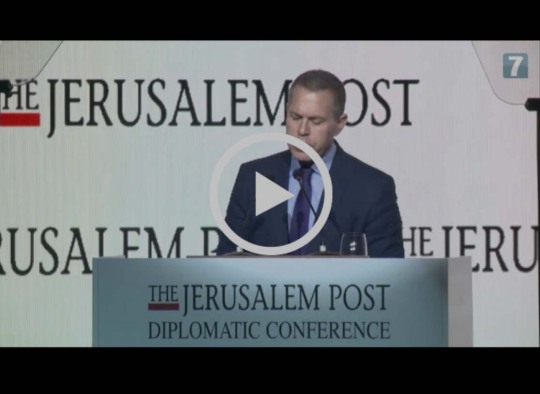
TERRORISM AND FOOTBALL
One of the ways my son and I attempt to ‘de-stress’ ourselves is by watching a game of football. Now of course, as fans of our beloved Norwich City, this can also be distressing too! However at the moment we are rejoicing as we are top of the Championship League Table. Now of course, back in the 70s and 80s, the UK had a lot of football hooligans to contend with which gave the game a bad name. Thankfully, those days are well behind, and generally most fans and opposing fans will walk along to the grounds in harmony. But imagine if instead of ‘Arsenal, Manchester City, Liverpool, Chelsea, Norwich etc. etc., we named our teams after villains, law-breakers or even terrorists? Or what would become if we had our school children playing for tournaments named after terrorists like those who blew up the London underground, or attacked the Manchester arena? Yet this is exactly what is happening in the Arab Palestinian areas – they have football teams named after founders of Hamas, Islamic Jihad, Black September, the PLO terror organization etc., in Fatah football.
In an article by Itamar Marcus and Nan Jacques Zilberdik, they write, “A football tournament for high school boys in Hebron, arranged by the local Fatah branch, named all 11 teams after terrorists - including terror leaders responsible for most of the deaths from terror Israel has suffered since its founding. Six were top Palestinian terror leaders and founders of terror organizations, while the other five were terrorists or members of terror organizations. The PA Ministry of Education endorsed the event's role modeling of terrorists with a representative who ‘honoured the winning players and teams.’”
Some of the team names included ‘The Martyr Yasser Arafat team’ (founder of the PLO and Fatah terror organizations in the 1960s); ‘The Martyr Ahmed Yassin team’ (founder of the Hamas terror organization); ‘The Martyr Fathi Shaqaqi team’ (founder of the Islamic Jihad terror organization) and ‘The Martyr Salah Khalaf team’ (head of the Black September terror organization). A full report can be found via the Palestinian Media Watch report here: https://www.palwatch.org/main.aspx?fi=157&doc_id=26716
POP SINGER PHARELL WILLIAMS ANGERS ANTI-ISRAEL GROUP
Anti-Israel groups say they are furious with Pharrell Williams for performing at this month’s gala in Los Angeles to raise money for the well-being of Israeli Defence Force (IDF) troops, including those injured. Pharrell Williams was among the likes of Ashton Kutcher, Gerard Butler, Andy Garcia, Fran Drescher, Ziggy Marley (son of Bob Marley), David Foster, Katharine McPhee, David Draiman and many more famous names to appear at the Friends Of The Israeli Defence Forces Western Region Gala – which raised over $60million – earlier this month at the landmark Beverly Hilton Hotel.
Pharrell Williams performed his hit song “Happy” after giving a speech, the Hollywood newspaper ‘Variety’ reported, along with NME (New Musical Express). In his speech he also condemned the recent Pittsburgh synagogue massacre. Williams said, “What happened in that synagogue was incredibly cruel, it was wrong, and it’s not supposed to be what our nation is. This group of people have been tested over and over and over again … but you guys show an incredible resilience.” Watch the Pharrell Williams hit song “Happy” in Jerusalem here.

FINALLY THIS WEEK... WHEN IS A PROTEST NOT A PROTEST?
This is a question that HonestReporting have been asking in relation to the violence on the Gaza border. So when is a protest not a protest? What is free speech, really? When the media say "protest", that generally means picket signs and free speech, right? But what if the "protesters" are throwing grenades, launching airborne firebombs and firing high calibre machine guns? What if children are living in fear? Should the media still call it a "protest?" You can watch this short video by HonestReporting and give them your response to their questions. Simply click here.
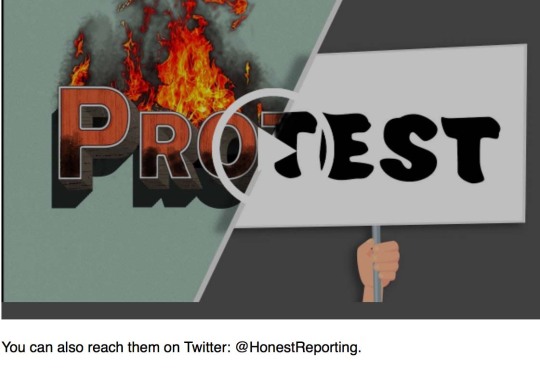
David Soakell
Media Correspondent
Tweet me @David_Soakell

0 notes